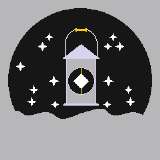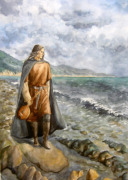From the Dawn of Time Appendices: Coasts, Cavegriffs and Calaquendi · 5:51am Apr 6th, 2023
Hello everyone, I do hope you enjoyed your trip to the neolithic and weren't too disappointed that it took place in the back end of Griffonia. If you were, then this blog ought to set things if not straight, then at least smooth the crumples.
Background
To begin with, I have the Clamavi De Profundis song 'Birth of an Age' to thank for sparking the concept of the story (and providing its name, being a fragment of the song's chorus), as well as the game King of Dragon Pass. Beginning with the latter, the situation portrayed in that setting and 'fantasy bronze age Celtic politics simulator' has inspired my vision of the land of Tailte Sioc and the bickering of its fractured peoples. As for the song, listening to it recently reminded me of how I had set up Maglor's long history with the Northern Tribes in No Sudden Flame, and made me question how far back it would have to go.
Being me, my response to the thought was to carry out a lot of complicated timey wimey calculations (which I may expand upon at a later date) that outputted the year 5784BLB, that is to say, almost seven thousand years before the events of Equestria at War.
This presented something of an unexpected problem for me, since by 1008ALB, Maglor ought to be around thirteen thousand years old. According to Nature of Middle Earth, Elves reach true old age in the sense of the consumption of the hröa (body) by the fëa (soul) at around fourteen millennia. But this varies from Elf to Elf, and Maglor being of particularly great power would 'burn out' faster than most.
Thus, having him alive (or perhaps 'embodied' would be a better way to put it) at the time of the Great War is a little bit of a stretch, but not beyond believability. All the same, by No Sudden Flame he should look like a white haired old man. This does not break continuity in terms of his role in the Skynavian conflict since Elves do not become decrepit in their old age like we Men do, but it raises questions as to his future that I will have to address at some point.
Griffonia in the 6th Millennium BLB
It is the early chalcolithic ('copper age'), the period in our own history that saw the rise of the first civilisations. Sumer in Mesopotamia, for example. Of course, one of the biggest differences from our world is the multitude of sapient species. In our history, the last 'true' Neanderthal (discounting dilute hybrids) had gone to their grave some thirty-five thousand years before the walls of Jericho were built.
Griffons are the joint earliest of all known settled peoples, predating the Zebra by around a millennium but contemporary with the earliest Pony agriculture. The world, particularly in the west, is warmer in this period, and the first farming communities and walled settlements are appearing around modern Wingbardy and Aquileia on Griffonia and Weter on Equus.
This early start will eventually see the two races grow to become by far the most numerous inhabitants of the world, combined with the relative lack of competing races. For while Minotaurs and Diamond Dogs are native to Griffonia, the former are hampered by rough land, will settle late and suffer in antiquity with the loss of their homeland to Pony invaders, while the latter are simply far more interested in mastering the deep places of the world and care little for the lands under sun. Though both races are known at this point to at least some Griffons, the remote location of the Minotaurs from the cradle of the Griffons has allowed a rapid, uncontested spread across the wide, verdant plains and forests of the western side of the continent. Diamond Dogs meanwhile seldom interact, and then usually only to barter.
The 'sted-dwellers' mentioned by the old retired adventurer Ariaramnes are in fact these early pioneers of civilisation. The fact however, is that though it is not yet quite so harsh as it becomes by the time of EaW, Tailte Sioc is not a cradle of Griffon civilisation for the same reasons Norway is not famed for being the place agriculture first developed in our world. However beautiful the fjords might be, it is a cold, bleak land of bitter winters and short summers.
Thus, Maglor finds himself in a land of hunter-gatherer tribes caught in that curious transitionary era between the dying stone age and blossoming of bronze, for better or worse.
Originally, I was going to deal with the great Pony migration toward the Riverlands which was driven by the coming of the Windigos (these being the folk who chose to flee the conflict rather than stand and unite), effectively telling the historical basis of the myth recited in 'Legend of the Lake' as a contrast, but the timeline simply did not allow. It did however, allow for pioneers and first contact.
I will delve in depth into Pony and Griffon migration in a later appendix entry, but for now suffice to say that my pre-existing timeline for Pony spread just barely allowed for the first few crossings to Griffonia. Lēohtsāwend's group is one of the first, if not the very first, band to make the crossing and have strayed far in their travels.
As in Legend of the Lake, the Pony language and names are based on Anglo-Saxon for the purposes of translation convention. Moreso in fact, since I allowed a little old English into that story to represent the slightly later period of codification of the myth and the like. The Griffon names meanwhile follow the pattern set by Smirdis in No Sudden Flame, being Greco-Persian in derivation. By the modern age, this tongue is largely dead, subsumed by that of later Pony migration waves speaking an offshoot of the tongue of Lēohtsāwend's folk, save in some loan-words and usage for names, especially for nobility.
In the context of this (mostly) finalised culture/language tree, the language Lēohtsāwend speaks would be one of many which falls under 'Northern Tribes'. Not being a linguist of the calibre of the great Professor Tolkien, I do not pretend to explain how Anglo-Saxon can be a precursor to Russian (used in lieu of inventing an entire Severyanan vocabulary) or turn into a distinctly Gaelic tongue through mixing with ancient Greco-Persian for the purposes of translation convention. In-universe, no tongue of ours would be understandable to the locals or vice-versa.
The twilight of stone
The Griffons of the north are 'peaceful' in the sense that the modern concept of war simply doesn't exist to them yet, in the same way such things as writing, countries or kings are beyond them. Raiding for food or goods is frequent and perceived by most in an almost sporting fashion, albeit a sport in which there is a small but statistically visible chance of getting maimed or killed. Most raids do not turn physically violent however, since the would-be thieves will usually flee when confronted. Then there are feuds, which are more serious and usually come out of when such conflicts sour. Generally speaking however, one is much more likely to die violently against a monster than one's fellow griff.
Along the interface between the settled and unsettled world, interaction is frequent. Not all of it is friendly, and the sted-dwellers have developed such unsportsmanlike habits as building stockades around their mud brick settlements to impede enterprising cattle rustlers (or monsters), but generally trade is the way of things. The vast majority of metal tools make their way into the north through this interface and a goodly number of primitive adventurers come the other way (such as Ariaramnes), finding good work as the trailblazers of their trade.
To put it bluntly: Magic use is rare and best likened to playing darts while blindfolded and facing thirty degrees left of the board in this era. It is utilised, such as by the headmare of the Unicorns met in the story to detect the lingering traces of Frosty Touch's field signature or their wider native affinity with telekinesis, there is obviously no standardisation. In Unicorns, this usually means that the crude 'spells' of one caster will die with them, as most will have come about through their Mark and so are very difficult to pass down via an oral tradition. Refinement and advancement is practically non-existent. Meanwhile Pegasi suffer from a lack of understanding of how to get much out of their potential beyond flight and Earthers largely ignore such pursuits, considering their passive abilities to be blessings of the gods rather than a tool that can be honed.
Griffons instead are limited by their materials. Enchantment often requires reagents, none of which have been formally documented yet. Additionally, it requires precise conditions and is by far best performed on metals or pure crystals. Stone does not work well and wood hardly at all. Gaumata's spear is enchanted, albeit to an extent that would seem almost childish to a Griffon of the 11th century ALB, used to magitech as a part of their daily life from the engine in the tram they ride to work to the autocorrection system in their typewriter.
Maglor
To begin wrapping up, this story was written as my entry for Fëanorian Week 2023, the time of year the Tolkien community celebrate their favourite disaster family. It was fun to write, even if writer's block struck for a while around the segment with the bear. I suspect it shows in the pacing. Though Maglor is interesting to write, I think this will be the only story I write from the first person with him as narrator, and probably in present tense as well. To my mind the experiment was worthwhile, but it demystifies him a bit too much, when the distance of third person and/or past tense (preferably both) would probably serve better. Please do give feedback though, since I would love to get more perspectives on this.
Maglor is of course an Elf. While in Tolkien's world, Elves are technically biologically 'human' (along with Men, Orcs and Hobbits, all falling within the term 'Eruhini'), I refrained from using the 'human' tag on the story as there is very little allusion to and no direct appearance of any Mannish character.
The chapter titles are in fact Elven names for various constellations that hint at the contents of said chapter. 'Valacirca' for example refers to the Plough, part of Ursa Major.
Maglor's presence in the world is something I have been questioned on in the Watsonian sense. While I cannot reveal any particular motives for this (if any indeed exist beyond random fluke of cosmology), I can say for those who have not already guessed that the time of his 'departure' from the shores of Middle Earth coincides with the Akallabêth (the drowning of Númenor) and the changing of the world that resulted from it. I will also let on that it does abide within the rules of cosmology Tolkien created, albeit with a dash of other Inkling influence in the interpretation.
From the Doylist perspective, dumping Maglor into the EaW world has the benefit of explaining his absence from the later narrative of Middle Earth in a manner that doesn't simply 'fridge' him by making him one of doubtless many casualties of the tsunami that wracked the western shores of the continent and brought Elendil, his sons and his followers out of the west.



